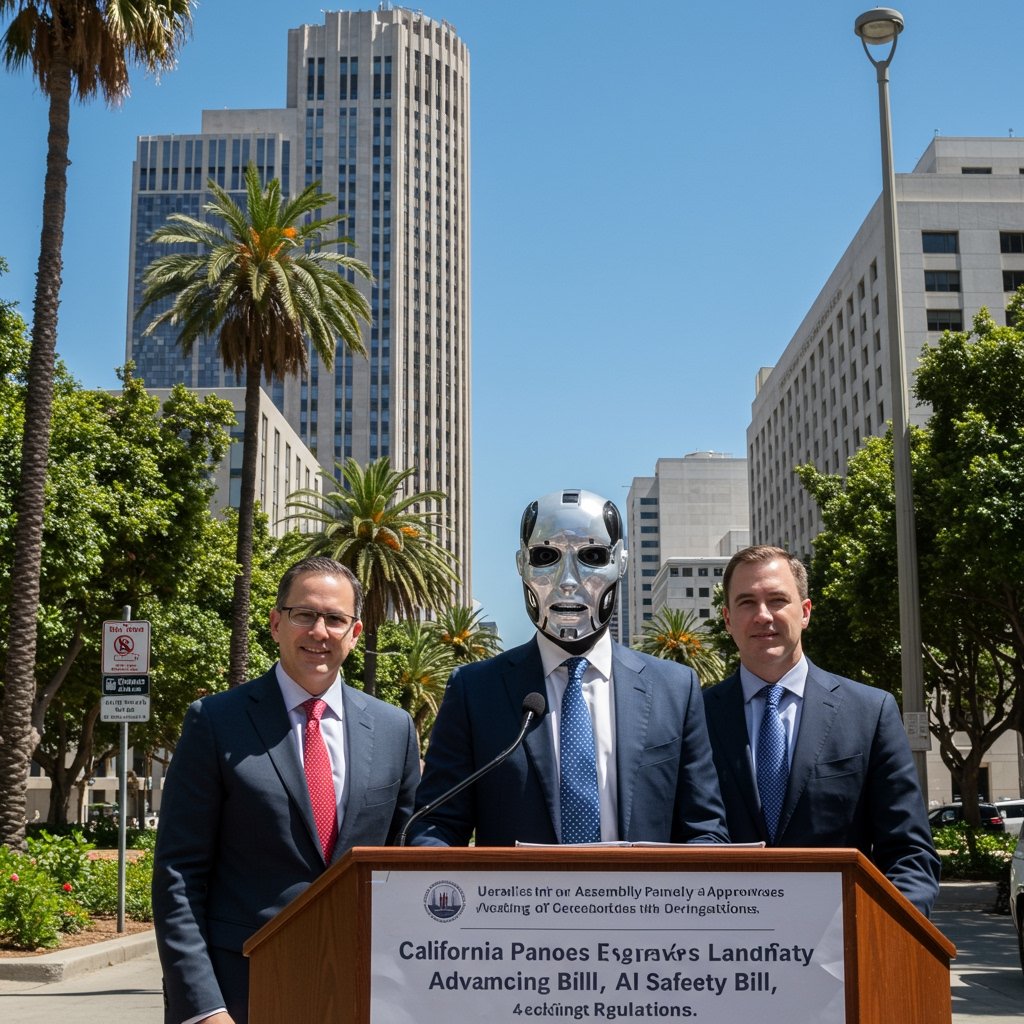California Legislators Push Ahead with AI Safety and Transparency Bill
SACRAMENTO, CA — In a significant move poised to impact the burgeoning artificial intelligence industry, a key legislative body in California today voted to advance a substantial bill aimed at regulating the development and use of large language models within the state. The California Assembly Technology & Innovation Committee cast a decisive vote, passing AB 1234 with a 9-3 margin, sending the controversial measure to the Assembly floor for broader consideration.
The legislation, if enacted, would impose stringent requirements on developers and deployers of AI models, particularly those exceeding a specified scale. At its core, AB 1234 mandates rigorous safety testing protocols for AI models boasting more than 1 trillion parameters, a threshold indicative of highly complex and powerful systems currently under development or already in use by leading tech firms, many headquartered in Silicon Valley. Beyond safety assessments, the bill also requires developers to disclose the sources of their training data, a crucial transparency provision that explicitly includes the identification of copyrighted material used in the training process.
Core Provisions and Rationale
The proponents of AB 1234 frame the bill as a necessary and proactive measure to address the potential societal risks associated with increasingly capable AI systems. Arguments in favor highlight concerns ranging from the spread of disinformation and bias to potential job displacement and the erosion of creative rights. Supporters, including consumer advocates, labor unions, and groups representing artists and writers, contend that current AI development practices lack sufficient oversight and transparency, making it difficult to anticipate or mitigate harmful outcomes.
They argue that mandating safety testing before models are widely deployed is essential to prevent unforeseen negative impacts at scale. The 1 trillion parameter threshold is intended to focus regulatory efforts on the most powerful and potentially disruptive AI systems. Furthermore, the requirement to disclose training data sources, specifically mentioning copyrighted material, is seen as a vital step towards protecting the rights of creators whose work may be ingested by AI models without explicit permission or compensation. This provision is particularly relevant in a state like California, a global hub for creative industries.
Industry Opposition and Concerns
Conversely, the bill has faced significant opposition from within the technology sector. Industry groups like TechNet and the California Chamber of Commerce have voiced strong concerns, arguing that AB 1234 could have detrimental effects on innovation and economic competitiveness within the state. Their primary objections center on the potential for the mandated requirements to be overly burdensome and costly.
Opponents argue that the safety testing requirements, while well-intentioned, could be technically challenging, expensive, and time-consuming to implement, potentially delaying the release of new AI products and services. They also express apprehension that the disclosure requirements, particularly regarding training data, could force companies to reveal proprietary information, undermining their competitive edge. Groups like TechNet have suggested that a patchwork of state-level regulations, as opposed to a national standard, could create regulatory complexity and confusion for companies operating across different jurisdictions.
The California Chamber of Commerce has specifically warned that the compliance costs associated with AB 1234 could be prohibitive, especially for smaller startups and potentially leading larger firms to invest elsewhere. The argument is that imposing such strict regulations on AI development in Silicon Valley could stifle the very innovation that has driven California’s economic success, potentially pushing AI research and development to states or countries with less stringent rules.
Path Forward in the Legislature
Following its passage through the Assembly Technology & Innovation Committee with the 9-3 vote, AB 1234 now advances to the full California Assembly floor. Here, it will face further debate, potential amendments, and another critical vote. If it successfully passes the Assembly, the bill will then move to the California State Senate for consideration by relevant committees and ultimately a floor vote in that chamber.
The legislative process allows for further discussion and potential refinement of the bill’s provisions, offering opportunities for stakeholders from various sectors – including technology, labor, creative industries, and civil society groups – to continue advocating for their positions. The journey through the Assembly floor and then the Senate promises to be a closely watched process, indicative of the complex balancing act legislators face in promoting innovation while attempting to address potential risks posed by rapidly evolving AI technology.
Broader Implications and Context
The consideration of AB 1234 in California is not occurring in a vacuum. Legislatures globally, including the U.S. Congress and the European Union (with its AI Act), are grappling with how to best understand, govern, and regulate artificial intelligence. As a leading state in technological development and innovation, California’s approach often sets precedents or influences discussions at the national level.
The outcome of the debate surrounding AB 1234 will likely be closely observed by other states and potentially inform federal regulatory efforts. The bill represents a significant attempt by state-level policymakers to proactively address the unique challenges and opportunities presented by advanced AI models, particularly large language models. Its progression through the legislative pipeline highlights the growing urgency felt by some policymakers to establish guardrails around powerful AI systems before their widespread societal impact becomes more pronounced or difficult to manage.
The bill’s focus on the 1 trillion parameter threshold and the explicit mention of copyrighted material in training data disclosure signal specific areas of concern that are gaining prominence in AI regulation discussions. The differing perspectives presented by supporters focused on societal safety and creator rights, versus opponents emphasizing the potential for stifled innovation and economic harm to Silicon Valley firms, encapsulate the core tensions inherent in the current global effort to govern AI.



















